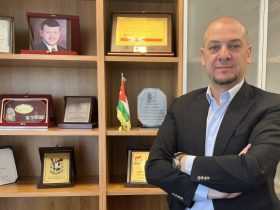Dealing with the psychological state is still one of the biggest dilemmas that a person faces from here. The search for a specialist who is able to be a helping hand for those who need help is an important step in the person’s path and a very important thing in getting rid of dilemmas.
Money and business had a meeting with one of the most prominent names in psychological counseling, and here are the details.
Tell us about yourself. Where did you study and what do you do now?
My name is Rasha Salib.
I am a licensed Clinical Psychologist and a licensed Marriage and Family Therapist currently working at Abdali Hospital in Amman, Jordan. I completed my undergraduate degree in Psychology at the University of Toronto. During my time in Toronto, I volunteered at the Eating Disorders and Addiction Clinic at the Center for Addiction and Mental Health, whereby I co-facilitated the Women’s Mindfulness-Based Cognitive group therapy sessions and the movement classes for patients with concurrent disorders to increase their energy levels and motivation.
After my five years in Canada, I came back to Amman and worked as a School Counselor for Grades 7-12 at the Ahliyyah School for Girls where I offered individual, family, and group counseling services to students and their parents to prevent and treat psychological, emotional and social difficulties.
In 2013, I started my Master of Arts in Clinical Psychology with an emphasis in Marriage & Family Therapy at Pepperdine University. During that time, I worked as a Trainee Marriage and Family Therapist at a community mental health clinic named Friends of the Family as well as at a private Drug and Alcohol Rehabilitation Center called Journey Malibu.
Upon my return to Amman, I worked as a clinical psychologist at Maria Den Braven Center, Dr. Nasri Jacir’s clinic, and at Jordan Hospital’s Gastrointestinal, Bariatric & Metabolic Center. Currently, I am working full-time at Abdali Hospita.
What is your mission/passion/future goals?
I am deeply passionate about changing mindsets about psychotherapy and breaking the stigma, and this is why I spend a lot of time on advocacy. I fight stigma by talking openly about mental health on social media and with all my patients and their families. I take every opportunity to educate myself and others about mental health using language that is not stigmatizing and I raise awareness for people and the media to make sure they are conscious of their language and comments. I highly encourage equality between physical and mental health. I choose empowerment over shame, and therefore I am honest and transparent with my patients about their diagnosis and treatment.
I see the best in people. I see the potential of what could be. I am amazed every day by the patients I work with. They inspire me to be better and to do more. I approach all of my patients with a sense of wonderment at the story that will unfold. It is my personal and professional mission to challenge the stigma and the pain people experience, one person at a time. Of course, the patient has to find his/her own way, and as his/her therapist, I am a guiding companion walking alongside them in their journey and guiding them through the darkness.
What made you decide to work in this career area?
In Amman, especially while growing up, there were not enough places where people can come to breathe, to be, to experience unconditional acceptance, positive reflection, and create alternative narratives and visions for themselves. Since I was young, when I used to see people struggle, I always wanted to reach out and help by showing compassion, empathy, and care for others.
I have come to learn that a tremendous amount of people feel alone, left out, unheard, irrelevant, tired, worthless, unconnected, unwelcomed, sad, anxious, and fearful. They need someone to listen to them. They need someone to help them connect to their true worth and inner value. They need a relationship that creates healing, instills hope and self-realization. They need skills to help them understand, validate and regulate their emotions.
Everyone needs help and I’m honored to be trusted with my patients’ deepest secrets, with the goal of relieving the pain, impart hope, gain more self-discovery/self-understanding, explore issues from childhood, find healthy and effective solutions, and achieve healing. I can’t imagine not being a Clinical Psychologist. This is my true calling and I wouldn’t be doing anything else!
What is the most rewarding part of your job?
The reward of helping people overcome their challenges is extremely fulfilling for me especially in a country/region where mental health is still fairly new. I enjoy creating an individually designed and personalized treatment plan for each patient depending on his/her needs.
I feel extremely blessed and grateful when I see my patients feel more empowered, more balanced, happy, and at peace with themselves, and when they become more aware of their experiences and their history and are able to cope with emotional challenges more effectively. I love having the opportunity to work with new people every day. Last but not least, there is a lot of personal growth in my work. I truly enjoy educating myself and learning about the new research and treatments that are evidence-based.
Education and Training
Bachelor of Science in Psychology, University of Toronto, Canada
Master of Arts in Clinical Psychology with an Emphasis in Marriage and Family Therapy, Pepperdine University, California, United States of America
Specialties
Anxiety Disorders: Panic Disorder, Obsessive-Compulsive Disorder (OCD), Generalized Anxiety Disorder, Specific Phobia, Social Anxiety Disorder, Post-Traumatic Stress Disorder (PTSD), Illness Anxiety Disorder
Attention Deficit / Hyperactivity Disorder (ADHD)
Body Dysmorphia
Couple and Family therapy (Relationship / Marital Problems, Infidelity, Premarital Counseling)
Eating Disorders (Anorexia Nervosa, Bulimia Nervosa, Binge Eating Disorder, Disordered Eating) and Weight Management
Grief, Bereavement and Loss
LGBTQ Counseling and Gender Dysphoria
Sleep Disorders (e.g., Insomnia)
Suicidal Ideations and Self-Harm Behaviors
Treatment of Addiction (Alcohol, Drugs, and Pornography / Sex Addiction)
























